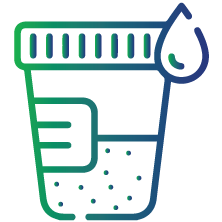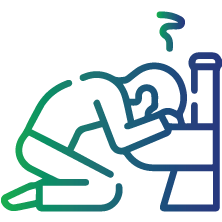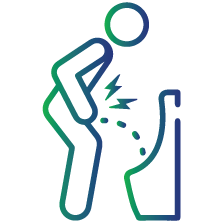
Uric Acid, Serum Test
Uric Acid, Serum
Uric acid is a normal waste product produced when the body breaks down chemicals called purines. After dissolving in the blood, most of the uric acid, passes through the kidneys and leaves the body through urine.
A uric acid test measures the level of uric acid present in the blood. High levels of this acid may get deposited in the bone joints and cause crystals of uric acid, leading to gout (a painful form of arthritis)
What is the serum uric test used for?
A serum uric acid test is indicated to:

Diagnose Gout

Monitor uric acid levels in cancer patients

Look for kidney stones
Who should get tested?
You are advised for a serum uric acid test if you have symptoms of gout such as:

Intense pain

Swelling of joint

Redness of the joints

Feeling warm

Had cancer treatment

Blood in urine

Cloudy urine

Nausea

Vomiting

Fever

Chills

Painful urination

History of gout, with a risk of developing kidney stones
Test preparation:
No special preparations are required to undergo a serum uric acid test. Your healthcare provider will insert a small needle into a vein in your arm and collect a few mL of blood into a sterile test tube.
Please tell your healthcare provider if you are taking any medications before undergoing the test
Interpretation of results
Normal levels – 3.5 to 7.2 mg/dL (milligrams per decilitre)
Deviations from the normal ranges:
· High levels of uric acid than normal in the blood may be due to acidosis, alcoholism, chemotherapy-related side effects, dehydration, diabetes, hypoparathyroidism, lead poisoning, leukemia, kidney diseases, purine-rich diet, kidney failure, kidney stones, etc.
Low levels of uric acid than normal in blood may be due to hereditary disease of metabolism, HIV infection, liver disease, low purine diet, certain medicines, syndrome of inappropriate antidiuretic hormone secretion, Fanconi syndrome, etc
FAQs
What is the turnaround time (TAT) for serum uric acid test?
The test results of serum uric acid are usually available within 1 – 2 working days after the sample collection. However, it could also take a little longer at times
Are there any risks associated with serum uric acid test?
No, there are no potential risks associated with serum uric acid test. However, it involves a negligible risk such as feeling a slight sting or bruise at the site where needle is inserted for sample collection. It usually resolves within a few minutes to a couple of hours. Rarely, the site can become infected
What are the medications that could affect my serum uric acid test results?
Serum uric acid test results can be affected by certain medications such as diuretics, low dose aspirin (<300mg daily), nicotinic acid, levodopa, ciclosporin, tacrolimus, etc
Can high uric acid be managed and prevented?
Yes, a long-term gout management programme can help regulate and even stop an individual's high levels of uric acid in the blood. A few medications that dissolve existing uric acid crystals can also help to prevent gout flare-ups.
Other ways to manage and prevent high uric acid levels are:
· By losing weight, if you are obese
· By eating a healthy diet (limit the intake of purine-rich foods such as fructose corn syrup, organ meats, red meat, fish, and alcohol-containing drinks)
I have kidney stones. Am I at risk of having high uric acid levels in my blood?
Yes, if you have a kidney disorder, you should always have your serum uric acid levels checked. Kidneys help in the filtration and excretion of wastes from the blood, including uric acid. Any abnormalities in kidney function may affect uric acid excretion, increasing its levels in the blood

